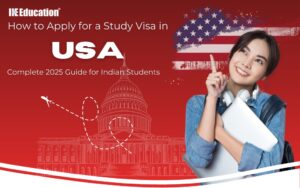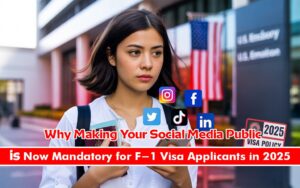Planning to study in the United States? The F1 visa USA is the most common non-immigrant
student visa for international students aspiring to pursue academic programs in American
institutions. This comprehensive guide by IIE Education walks you through every step—from
application to interview—while sharing expert insights on avoiding rejections, especially under
Section 214(b).
Step-by-Step Process for F1 Student Visa
1. Get Accepted by a SEVP-Approved Institution
Before you can apply for an F1 visa USA, you must receive an I-20 form from a SEVP-approved
school (Student and Exchange Visitor Program). This form is crucial, as it confirms your
admission and contains your program details.
2. Pay the SEVIS Fee
The SEVIS I-901 fee must be paid online before scheduling your visa appointment. Retain the
payment receipt for your documentation.
3. Complete DS-160 Form
Fill out the DS-160 form (Nonimmigrant Visa Application) online. Be accurate with your
information—this form is reviewed during your interview.
4. Book Visa Appointment and Pay Visa Fee
Once your DS-160 is complete, schedule your appointments at the VAC (Visa Application
Center) and the US Embassy or Consulate. Pay the non-refundable visa application fee.
5. Attend Biometrics and Visa Interview
Your fingerprints and photograph will be taken at the VAC. The visa interview, held at the US
Embassy or Consulate, is the final step before your visa approval.
Required Documentation Checklist
When attending your visa appointment, make sure to carry:
- Valid passport
- DS-160 confirmation page
- Visa appointment confirmation
- I-20 form
- SEVIS fee receipt
- Academic transcripts and test scores (e.g., TOEFL, IELTS, GRE, etc.)
- Proof of financial support
- Statement of purpose or intent to return home
- Passport-sized photos as per US specifications
IIE Education can help you organize your documents and ensure nothing is missing, increasing
your chances of visa success.
Common F1 Visa Interview Questions
Mastering your F1 visa interview tips is crucial to success. Here are some frequently asked
questions:
- Why did you choose this university and course?
- Who is sponsoring your education?
- What do your parents do?
- What are your plans after graduation?
- How will you manage your living expenses in the US?
Your responses should be confident, honest, and align with the details on your documents.
214(b) Visa Rejections: What They Mean and How to Avoid Them
One of the most common reasons for F1 visa USA denials is under Section 214(b), which means the consular officer wasn’t convinced you will return to your home country after your studies.
Reasons for 214(b) Rejection:
- Weak ties to your home country
- Inconsistent or vague answers during the interview
- Insufficient financial documentation
- Lack of academic clarity or career purpose
How to Avoid 214(b) Rejection:
- Demonstrate strong family, economic, or social ties to your home country
- Clearly explain your career goals and how studying in the US helps
- Show consistent academic and financial background
- Practice common F1 visa interview tips with professionals like those at IIE Education
Why Choose IIE Education for Your F1 Visa Guidance?
At IIE Education, we specialize in personalized counseling for the US student visa guide process. From selecting the right universities to preparing for your interview, our expert team
ensures you’re fully equipped to handle each step with confidence.
We offer:
- Mock interview sessions with real-time feedback
- Financial planning assistance
- SOP and documentation support
- Post-visa guidance and travel preparation
Let IIE Education be your partner in achieving your American dream.
Final Tips for F1 Visa Success
- Be honest and precise in your responses
- Keep your documents well-organized
- Dress formally and arrive early on your interview day
- Maintain a positive and confident attitude
The F1 visa USA process may seem daunting, but with the right guidance and preparation, you
can succeed. Trust IIE Education to help you at every stage of your US student visa guidejourney.
Frequently Asked Questions (FAQs) – F1 Student Visa USA
1. What is an F1 visa and who needs it?
The F1 visa USA is a non-immigrant student visa that allows international students to pursue
academic programs in the United States. You need an F1 visa if you plan to study full-time at a
SEVP-approved institution, such as a university, college, or language training program.
2. When should I apply for an F1 visa?
You can apply for your F1 visa USA up to 120 days before your course start date as mentioned on your I-20 form. However, you can enter the US no more than 30 days before the course begins.
3. What documents do I need for the visa interview?
You will need:
- Valid passport
- DS-160 confirmation
- I-20 form
- SEVIS fee receipt
- Visa appointment confirmation
- Academic transcripts
- Proof of financial support
- Passport-sized photographs
IIE Education helps students compile a complete and accurate document set for a smooth
interview experience.
4. What is a 214(b) rejection?
A 214(b) rejection means the consular officer wasn’t convinced you have strong ties to your
home country or clear intentions to return after your studies. This is a common reason for visa
denial.
To avoid this, you must show compelling personal, financial, and career ties to your country. IIE
Education offers expert coaching to help reduce the chances of this outcome.
5. Can I work while on an F1 visa?
Yes. F1 students can work:
- On-campus up to 20 hours per week during the semester
- Full-time during official school breaks
You may also be eligible for CPT (Curricular Practical Training) or OPT (Optional Practical Training) after completing one academic year
6. What are the most important F1 visa interview tips?
- Be confident and concise in your answers
- Be honest about your goals and financial situation
- Maintain consistency with your documents and answers
- Avoid over-explaining unless asked
IIE Education conducts mock interviews to help students master these essential F1 visa interview tips.
7. What should I do if my F1 visa is rejected?
If your visa is denied under 214(b), you can reapply with a stronger application and clearer
evidence of your intent to return home. IIE Education offers rejection analysis and helps you
prepare for a successful second attempt.
8. How can I get help with my F1 visa application?
You can contact IIE Education for personalized support with:
- University selection
- Visa documentation
- Financial planning
- Interview preparation
- Rejection handling
Our expert counselors ensure that every student receives step-by-step guidance throughout
their US student visa guide journey





